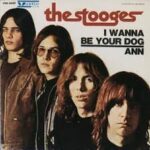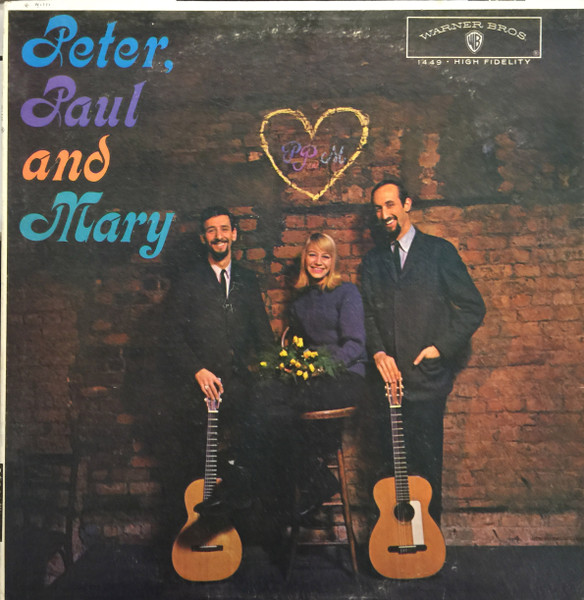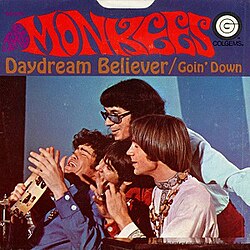 “I Wanna Be Your Dog” by The Stooges is more than a song; it is a manifesto of raw rebellion and unfiltered primal energy that helped define the proto-punk movement in the late 1960s. Released on the band’s self-titled debut album in 1969, this track immediately distinguished The Stooges from their contemporaries. While much of rock at the time leaned toward elaborate arrangements and psychedelic experimentation, The Stooges stripped music down to its barest, most visceral elements. “I Wanna Be Your Dog” operates on a foundation of relentless, hypnotic riffing, minimalist chord structures, and guttural, almost animalistic vocals that embody a form of musical defiance that was shocking, thrilling, and revolutionary for its time. The song’s opening riff, simple yet hypnotic, immediately sets a tone of danger and urgency. The guitar, bass, and drums lock into a gritty, repetitive groove that feels both mechanical and feral, establishing a sense of obsession and desire that runs through the lyrics. It is the kind of musical simplicity that, rather than diminishing the song, amplifies its power, proving that raw emotion can be more compelling than technical prowess.
“I Wanna Be Your Dog” by The Stooges is more than a song; it is a manifesto of raw rebellion and unfiltered primal energy that helped define the proto-punk movement in the late 1960s. Released on the band’s self-titled debut album in 1969, this track immediately distinguished The Stooges from their contemporaries. While much of rock at the time leaned toward elaborate arrangements and psychedelic experimentation, The Stooges stripped music down to its barest, most visceral elements. “I Wanna Be Your Dog” operates on a foundation of relentless, hypnotic riffing, minimalist chord structures, and guttural, almost animalistic vocals that embody a form of musical defiance that was shocking, thrilling, and revolutionary for its time. The song’s opening riff, simple yet hypnotic, immediately sets a tone of danger and urgency. The guitar, bass, and drums lock into a gritty, repetitive groove that feels both mechanical and feral, establishing a sense of obsession and desire that runs through the lyrics. It is the kind of musical simplicity that, rather than diminishing the song, amplifies its power, proving that raw emotion can be more compelling than technical prowess.
Iggy Pop’s vocals on “I Wanna Be Your Dog” are the perfect marriage of sneer and vulnerability. There is an almost desperate submission in the line “I wanna be your dog,” a declaration that is as sexually charged as it is psychologically provocative. Iggy’s delivery oscillates between monotone resignation and bursts of animalistic intensity, creating a tension that is both unsettling and magnetic. The lyrics themselves are straightforward, repetitive, and undeniably primal, reinforcing the song’s theme of surrender to desire and raw instinct. This thematic focus on base human emotion—lust, frustration, aggression—was something that mainstream rock had rarely explored with such unflinching honesty at the time.
The instrumentation contributes heavily to the song’s enduring impact. Ron Asheton’s guitar riff is the spine of the track, drenched in distortion yet deliberately limited in scope. It does not seek to dazzle with virtuosity; instead, it entrains the listener into a trance-like state, mirroring the obsessive fixation expressed in the lyrics. The bass line, simple and pounding, provides a relentless pulse, almost like the heartbeat of a creature locked in servitude. Scott Asheton’s drums are heavy and unyielding, driving the song forward with a minimalist, almost tribal precision that complements the guitar and vocals perfectly. The combination of these elements results in a sound that is at once claustrophobic and liberating, raw but irresistibly compelling.
“I Wanna Be Your Dog” also exemplifies the Stooges’ broader approach to music, which eschewed sophistication in favor of immediacy and emotional truth. Whereas much of rock music at the time celebrated extended solos, psychedelic flourishes, and complex arrangements, The Stooges focused on the visceral impact of repetition, rhythm, and intensity. There is a deliberate crudity in the production, a lo-fi aesthetic that enhances the sense of authenticity and urgency. Each instrument is present in its most primal form, and the slight imperfections—the scratchy guitar tones, the almost live-sounding mix, the raw vocal takes—serve to heighten the song’s emotional resonance. It feels less like a polished product and more like a live exorcism of desire and aggression captured on tape.
The cultural impact of “I Wanna Be Your Dog” cannot be overstated. It arrived at a moment when rock music was both expanding its artistic ambitions and becoming increasingly commercialized. The Stooges’ willingness to embrace simplicity, aggression, and sexuality in a stripped-down, confrontational form challenged the prevailing notions of what a rock song could be. It provided a blueprint for punk rock bands in the 1970s, from the Ramones to the Sex Pistols, who would take inspiration from the Stooges’ raw energy, minimalist approach, and disregard for convention. By reducing music to its essential emotional and sonic components, The Stooges demonstrated that rock could shock, provoke, and excite without elaborate production or virtuosic displays.
The song’s structure is deceptively simple, which is part of its genius. Built on three primary chords and a relentless, cyclical riff, it relies on repetition to generate a hypnotic tension. The restraint in the composition allows the emotion to dominate, creating a feeling of impending release that never quite resolves, keeping the listener in a constant state of anticipation. Iggy Pop’s vocals mirror this structure, cycling through the central motif with variations in intensity that punctuate the minimalist instrumentation. This structural minimalism is one reason the song has remained influential; it is a masterclass in using simplicity to maximize impact, proving that sometimes less truly is more.
“I Wanna Be Your Dog” also carries a distinct sense of theatricality, one that foreshadows Iggy Pop’s future stage persona. The song’s repetitive, chant-like nature, combined with the aggressive instrumentation and provocative lyrics, lends itself to live performance in a way that few contemporary tracks did. When performed on stage, the song becomes a ritual of controlled chaos, with the band locked into a hypnotic groove and Iggy embodying the animalistic, almost feral energy that the song suggests. This performative aspect of the track contributed to the Stooges’ reputation as one of the most exciting live acts of their era, a reputation that has endured across decades.
The song’s lyrical simplicity masks a depth of psychological and emotional insight. On one level, it is a raw, primal statement of desire and submission, yet it also carries undertones of alienation, obsession, and even self-deprecation. The repeated invocation of wanting to be a dog can be interpreted as a critique of the surrender of identity to another’s control, a metaphor for the compromises and submission demanded in personal relationships, or even a reflection on the objectification inherent in human desire. This layered ambiguity is part of what gives the song its enduring appeal; it is as open to interpretation as it is immediate in its impact, allowing different listeners to connect with it in a variety of ways.
From a historical perspective, “I Wanna Be Your Dog” occupies a crucial position in the evolution of rock music. It represents a pivot from the expansive experimentation of late-1960s rock toward the stripped-down, high-energy ethos that would define punk and alternative rock. Its influence is evident not only in the sonic characteristics of countless bands that followed but also in the attitude it conveys—defiant, confrontational, and unrepentantly raw. The song’s impact resonates in everything from garage rock revival bands to contemporary punk-inspired acts, illustrating the lasting power of its primal simplicity and emotional directness.
The production style of the song also contributes to its raw aesthetic. Recorded with minimal overdubs and a focus on capturing the energy of the band’s performance, the track feels immediate and urgent. The slightly abrasive guitar tone, the pounding bass, and the live-sounding drums all contribute to a sense that the listener is right there in the room with the band, experiencing the music as an unfiltered, almost dangerous live event. This approach to recording helped set the Stooges apart from their more polished contemporaries, reinforcing the authenticity and intensity that make the song so compelling.
“I Wanna Be Your Dog” has been widely covered and referenced, which speaks to its lasting impact. Bands and artists across genres—from punk to industrial to alternative rock—have drawn inspiration from its raw simplicity, obsessive groove, and confrontational lyrics. Each reinterpretation reinforces the song’s status as a touchstone for rebellious, emotionally direct rock music, proving that its influence extends far beyond its original context. Yet no cover or homage quite captures the unique combination of urgency, danger, and animalistic intensity that the Stooges achieved in the original recording.
The song’s enduring appeal also lies in its ability to provoke strong emotional responses. It is a track that invites physical and emotional engagement—head-nodding, foot-tapping, and an almost involuntary reaction to the tension and release inherent in the groove. The raw energy of the performance, the insistence of the riff, and the primal plea of the vocals combine to create a kind of cathartic experience that few songs manage to achieve. It is music designed to be felt viscerally, rather than analyzed intellectually, and its power is inescapable when approached in this way.
Beyond its musical and lyrical elements, “I Wanna Be Your Dog” functions as a cultural statement. In the late 1960s, a period often associated with idealistic experimentation and artistic grandiosity, the Stooges offered something starkly different: a confrontation with raw, unpolished human emotion. The song’s aggression, sexual frankness, and minimalism challenged both societal norms and musical conventions, creating a statement about authenticity, rebellion, and the power of simplicity. It is a song that defies easy categorization, operating simultaneously as rock, proto-punk, and a kind of performance art in sonic form.
The Stooges’ performance of “I Wanna Be Your Dog” also illustrates the band’s unique chemistry. Each member contributes to the overall intensity while maintaining a deliberate simplicity. Ron Asheton’s guitar is both hypnotic and menacing, Scott Asheton’s drums provide unrelenting drive, and Dave Alexander’s bass anchors the groove with muscular precision. Iggy Pop’s vocals ride over this foundation like a predator prowling through chaos, creating an interplay of control and abandon that is central to the song’s magnetic energy. The synergy between these elements is what elevates the track beyond its minimalistic construction, creating a sonic experience that is unforgettable.
Listening to “I Wanna Be Your Dog” today, it is striking how contemporary it still feels. Its raw energy, confrontational attitude, and minimalist approach continue to resonate with listeners decades after its release. The song’s influence on punk, alternative, and garage rock is still apparent, and its ability to evoke a visceral reaction remains undiminished. Its enduring appeal lies not in technical sophistication or polished production but in its uncompromising commitment to emotion, energy, and authenticity.
Ultimately, “I Wanna Be Your Dog” by The Stooges is a landmark track not because it conforms to conventional standards of musical excellence but because it disregards them entirely. Its primal energy, obsessive groove, raw vocal delivery, and minimalist structure create a work that is as compelling as it is confrontational. It challenges listeners, provokes emotional responses, and has inspired generations of musicians who seek to capture its raw immediacy. In a world often obsessed with virtuosity and complexity, the song’s power lies in its simplicity, its honesty, and its refusal to apologize for its intensity.
The track is more than a song; it is a manifesto, a declaration of rebellion, and a masterclass in channeling raw emotion into music. It captures a moment in time when rock was willing to be dangerous, confrontational, and utterly unrefined, yet in doing so, it transcends its era. “I Wanna Be Your Dog” remains a seminal work in the history of rock music, an anthem for anyone who feels the pull of raw instinct, unfiltered desire, and unrepentant rebellion. Its power has not waned, and its influence continues to ripple through music today, proving that sometimes the most enduring art is that which embraces its own primal simplicity.
The song remains a testament to The Stooges’ vision, Iggy Pop’s charisma, and the enduring allure of music that is unapologetically raw. Its combination of hypnotic repetition, visceral energy, and thematic audacity ensures that it will continue to resonate for generations to come. Listening to “I Wanna Be Your Dog” is an experience that reminds us that music can be a conduit for emotion, rebellion, and raw human instinct, and that sometimes the most memorable songs are those that strip everything down to its essential, unfiltered core.
This is the song where minimalism meets chaos, where desire meets aggression, and where rock music found one of its most primal, enduring, and influential expressions.


